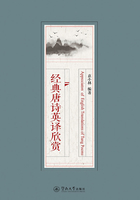
9.枫桥夜泊
月落乌啼霜满天,江枫渔火对愁眠。
姑苏城外寒山寺,夜半钟声到客船。
中文解读
《枫桥夜泊》是唐朝安史之乱后,诗人张继途经寒山寺时写下的一首羁旅诗。在这首诗中,诗人精确而细腻地讲述了一个客船夜泊者对江南深秋夜景的观察和感受,勾画了月落乌啼、霜天寒夜、江枫渔火、孤舟客子等景象,有景有情,有声有色。此外,这首诗也将作者羁旅之思、家国之忧,以及身处乱世尚无归宿的顾虑充分地表现出来,是写愁的代表作。
这首诗句句形象鲜明,可感可画,句与句之间逻辑关系又非常清晰合理,内容晓畅易解。不仅中国历代各种唐诗选本和别集选入此诗,连亚洲一些国家的小学课本也曾收录此诗。寒山寺也因此诗的广为传诵而成为游览胜地。张继流传下的作品很少,全唐诗收录一卷,然仅《枫桥夜泊》一首,已使其名留千古。
白话译文
月亮已落下乌鸦啼叫寒气满天,对着江边枫树和渔火忧愁而眠。
姑苏城外那寂寞清静寒山古寺,半夜里敲钟的声音传到了客船。
英译一
Anchored at Night by the Maple Bridge
Translated by Tsai Tingkan
The moon is setting, rooks disturb the frosty air,
I watch by mapled banks the fishing-torches flare.
Outside the Suzhou wall, from Hanshan Temple's bell,
I hear its sound aboard and feel its midnight spell.
(rook n.乌鸦 flare n.闪光)
英译二
Mooring by the Maple Bridge at Night
Translated by Xu Yuanchong
At moonset cry the crows, streaking the frosty sky,
Dimly lit fishing boats' neath maples sadly lie.
Beyond the city walls, from Temple of Cold Hill,
Bells break the ship-borne roamer's dream and midnight still.
(moor v.系住,停泊 streak v.快速移动 roamer n.漂泊者)
英译三
Night Moor at Maple Bridge
Translated by Huang Yunte
Moon set, crows caw, frost fills the sky,
River maples, fishing fires, drowsing in sorrow.
Outside Gusu city, the Cold Mountain Temple,
At the middle night bell, arrives the visitors'boat.
(caw v.乌鸦叫 drowsing v.打瞌睡)
英译欣赏
The poet stopped his boat at the Maple Bridge in the night outside Suzhou City, indulging himself in a solitary delightful scenery of autumn night and hearing bell ringing from the cold Hill Temple.
《枫桥夜泊》的英译很多,这里选用的是蔡廷干(清政府第二批留美生)、许渊冲和黄云特(20世纪90年代北大毕业留美)的译文。
从题目的翻译来看,“枫桥”都直译为Maple Bridge,但“泊”字,英译一用anchor,英译二、三用moor,从意义上看,anchor 指抛锚停泊, moor指系住,使停泊。在苏州这种小桥流水的地方,应该是小船系绳停泊,故用moor更好。
“月落乌啼霜满天”,英译一几乎直译:The moon is setting, rooks disturb the frosty air,月亮正在落下,乌鸦的叫声打扰了寒冷的夜空。这里用frosty air替代“霜满天”。
英译二:At moonset cry the crows, streaking the frosty sky,这里用cry更能突出“乌啼”的意境。
英译三则用主谓结构来翻译:Moon set, crows caw, frost fills the sky,通过三个动词营造出寂静的画面。黄云特翻译了美国诗人庞德《诗章》,他的翻译带有庞德的风格。
第二句“江枫渔火对愁眠”,是一个无主语句,将视角拉到江边和江中,江枫是静的,渔火是闪动的。
英译一:I watch by mapled banks the fishing-torches flare,我在枫叶岸边看着渔火闪动。
英译二:Dimly lit fishing boats' neath maples sadly lie, dimly lit 和sadly lie 相对应,译出了“愁眠”的心绪。
英译三:River maples, fishing fires, drowsing in sorrow,两个名词短语:river maples, fishing fires; drowsing in sorrow,直译意为在忧伤地打瞌睡,即“对愁眠”,仍是庞德的风格。
“姑苏城外寒山寺,夜半钟声到客船”,这里写钟声的出处,专有名词“姑苏”“寒山寺”,应该首字母大写。
英译一:Outside the Suzhou wall, from Hanshan Temple's bell, I hear its sound aboard and feel its midnight spell。
这里一个wall,似乎多此一举,钟声“到客船”,是从远处传到船上。译成I hear则是从船上听到,意境有点不一致。
英译二仍采用意译:Beyond the city walls, from Temple of Cold Hill, Bells break the ship-borne roamer's dream and midnight still。
用beyond一词来指城外,指的范围更大更远,贴近原意。
英译三:Outside Gusu city, the Cold Mountain Temple, At the middle night bell, arrives the visitors'boat。
姑苏城和寒山寺采用了广为人知的译法,Gusu city, the Cold Mountain Temple,比较完整。
关键的“到”字是翻译的难点,三个译文分别用了I hear、break、arrive。I hear没有钟声传到之意;break 打破了船上旅客的梦,既体现夜的寂静,又衬托诗人的苦闷心情,非常传神;arrive 一词客观地写出了钟声传到船上的动作。
思考
对于“姑苏”这样的地名,怎样翻译更贴切易懂?